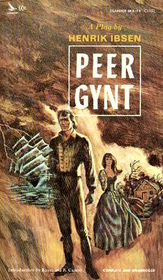the emptiness of prodigality., July 2, 2001
Reviewer: Cipriano "www.bookpuddle.blogspot.com" (Planet Claire)
Often funny. Often bizarre. Always deep. Peer Gynt first appears to me as this self-centered youth who cares only for himself and the satisfaction of his impulses and whims at any cost. He is the quick non-thinker, who leaves a life of relative conventionality to roam as a dissolute wanderer. He is indeed all of these things, but all the while his "self" is not "centered". At the end of his adventures as a libertine, the grey-bearded Peer Gynt is at a cross-roads, and he asks the character of the Button Moulder this question: "What, after all, is this being one's self?" The Button Moulder replies that being one's self means slaying one's Self, and furthermore "observing the Master's intentions in all things." Peer Gynt contemplates this... restraint and delayed gratification have never been manageable themes with him. In my opinion, this whole idea of the search for the "self" is what Peer Gynt is all about. At the very final crossroads he is redeemed by the undeserved forgiveness and love of Solvieg, the woman he has once abandoned... this scene being a beautiful picture of the grace and love of God that is available to the Peer Gynt in every reader.
Ibsen originally wrote Peer Gynt as a poem, and therefore we lose the Norwegian rhyme and metre in any English translation. To compensate if at all possible, I suggest reading the play while listening to the incidental music of Edvard Grieg, specifically composed to accompany the live performance of Peer Gynt. (Note: My review is based on the translation by Peter Watts).
Reviewer: Cipriano "www.bookpuddle.blogspot.com" (Planet Claire)
Often funny. Often bizarre. Always deep. Peer Gynt first appears to me as this self-centered youth who cares only for himself and the satisfaction of his impulses and whims at any cost. He is the quick non-thinker, who leaves a life of relative conventionality to roam as a dissolute wanderer. He is indeed all of these things, but all the while his "self" is not "centered". At the end of his adventures as a libertine, the grey-bearded Peer Gynt is at a cross-roads, and he asks the character of the Button Moulder this question: "What, after all, is this being one's self?" The Button Moulder replies that being one's self means slaying one's Self, and furthermore "observing the Master's intentions in all things." Peer Gynt contemplates this... restraint and delayed gratification have never been manageable themes with him. In my opinion, this whole idea of the search for the "self" is what Peer Gynt is all about. At the very final crossroads he is redeemed by the undeserved forgiveness and love of Solvieg, the woman he has once abandoned... this scene being a beautiful picture of the grace and love of God that is available to the Peer Gynt in every reader.
Ibsen originally wrote Peer Gynt as a poem, and therefore we lose the Norwegian rhyme and metre in any English translation. To compensate if at all possible, I suggest reading the play while listening to the incidental music of Edvard Grieg, specifically composed to accompany the live performance of Peer Gynt. (Note: My review is based on the translation by Peter Watts).




